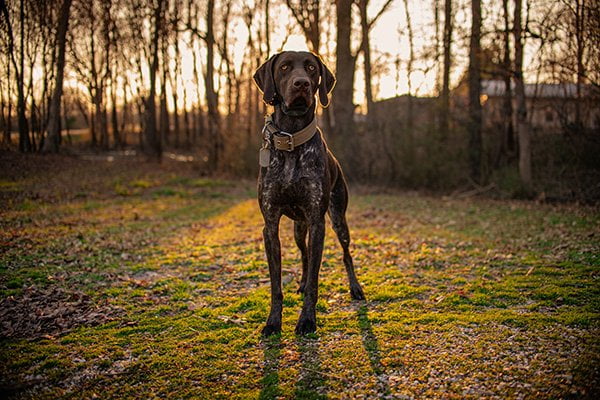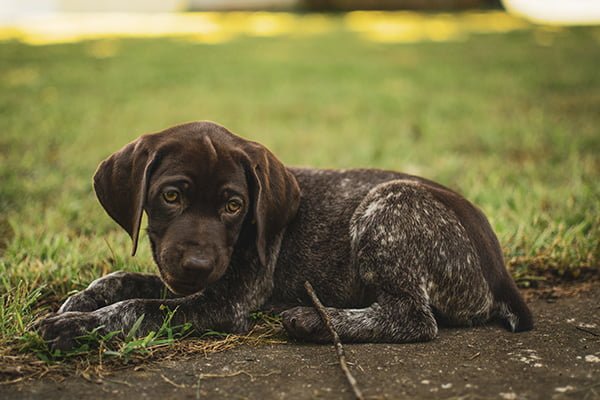The German Shorthaired Pointer is a versatile and intelligent breed known for its athleticism and loyalty. Originating in Germany, these dogs were originally bred for hunting but have since become popular family pets due to their affectionate and playful nature. With their short coat, muscular build, and boundless energy, German Shorthaired Pointers are a great choice for active families who love the outdoors.
In this article, we will explore the history, characteristics, and care requirements of this wonderful breed to determine if German Shorthaired Pointer is the right breed of dog for you. Here is what you need to know.
Origin
The German Wirehaired Pointer originated in Germany in the late 19th century. Breeders were looking to breed the most versatile hunting and sporting dog with a number of distinct characteristics. With careful cross-breeding of the Wirehaired Pointing Griffon, German Shorthaired Pointer, German Rough Haired Pointer, and the hunting Pudelpointer, the German Wirehaired Pointer as we know it was bred. This dog was deemed ideal for rough shooting, as it is successful at wildfowling or picking up at shoots. In the 20th century, this breed was introduced to the United States, though it was not very popular because of its origin. The German Wirehaired Pointer Club of America, established in 1959, is the American Kennel Club (AKC) official Parent Club for the Wirehair breed.
Size
Often confused with the German Shorthaired Pointer, the only way to differentiate between the two is coat length and size in general. The German Wirehaired Pointer is referred to as a medium to large breed dog. Males usually grow to 24-26 inches tall, while females' height is usually around 22 inches. An average fully-grown adult will weigh within the range of 50-70 pounds.
Personality
Because this is a working breed, German Wirehaired Pointers are extremely intelligent and energetic. These dogs are extremely eager to please and loyal, and very energetic. German Wirehaired Pointers will bark and vocalize, sometimes in reaction to wild animals such as birds, strange dogs, and even people, or to alert of potential danger. They are always watchful and protective in nature, making them extremely loyal companions, but they are also friendly to strangers as long as they don't perceive a threat. German Wirehaired Pointers thrive on human companionship and do well in family settings as they are very affectionate, playful, energetic, and loving.
German Wirehaired Pointer Temperament
German Wirehaired Pointers are extremely loving, especially with people that they know well. They are also usually good with children and can be tolerant of playtime. It is important to watch these breeds when playing with small children, though, because of their large size and energetic nature. Because they like to play, hunt, and retrieve, their excitement can allow them to play aggressively at times, so small children should be supervised.
These dogs are sometimes temperamental when around unfamiliar dogs, and they should be supervised when introduced to other dogs and during playtime. As a watchful companion, German Wirehaired Pointers are often skeptical of strangers. They tend to alert when there are potential threats but warm up quickly when introduced to new people.
Diet/ Nutritional needs
The German Wirehaired Pointer should be fed a nutritious, balanced diet that is appropriate for their age (puppy, adult, senior). As energetic, active, working dogs, this breed needs to be fed a healthy and nutrient-dense diet in the proper amount daily to keep up with their activity levels.
A standard amount to feed a full-grown adult is around 3 cups of dry food daily, typically split into two meals of 1.5 cups morning and night. It is important, however, to note that the pet's age, metabolism, weight, and activity levels are important factors to consider when determining exactly how much and what diet to feed.
Consult with your veterinarian for specific recommendations for your German wirehaired Pointer. An abundance of clean, freshwater should always be available to keep these active dogs appropriately hydrated.

Source: Pexels
Activity/ Exercise
German Wirehaired Pointers have high exercise requirements and thrive on vigorous exercise. As a hunting breed, these dogs need an extreme amount of physical and mental stimulation and daily exercise for their physical and mental health. German wirehaired pointers need at least 2 hours of physical exercise daily to meet their needs. They will usually spend their time running, jumping, and playing throughout the day and are not often seen just laying around or sleeping for long periods of time. German Wirehaired Pointers thrive in dog sports like field trials, tracking, agility, and competitive obedience.
If they don't receive an appropriate amount of physical exercise, they tend to become jumpy and boisterous towards the end of the day. These dogs also need mental stimulation – puzzles, retrieving, hunting, and other games or jobs are important to keep these dogs happy.
Appearance/ Colors
The German wirehaired Pointer, as noted in its name, has a wiry, medium-length coat. These dogs are muscular and sturdy. They have a strong muzzle, a deep chest, and notably webbed feet. Their wiry coat gives them a rugged-looking appearance, often with a shaggy beard and thick, fuzzy eyebrows. These dogs are often seen in various colors and patterns, including solid, multi-colored, patched, and/or ticked, and can be a mixture of black, white, and liver.
Grooming needs
Though medium-length and wiry, the coat of the German Wirehaired Pointer's grooming needs is actually quite low maintenance. While they do shed, a simple weekly brush of your German wirehaired Pointer's coat will help to remove dirt and debris and keep them comfortable. Because these dogs usually spend a lot of time outside, it is important to keep them clean, especially their ears, and they should be inspected often for fleas, ticks, and other external parasites. Other basic grooming needs include regular nail trims and bathing as needed.
Adaptability
The German Wirehaired Pointer is actually a very adaptable dog and can make the most of any changes to its living routine. They handle change well and can adapt to new environments as needed. While they are adaptable, the right living environment is extremely important to keep these dogs happy and healthy. They benefit from having a large yard to roam and play in and plenty of space indoors to play. They can do well in an apartment environment if they get plenty of physical and mental stimulation throughout the day.
Trainability
Training German wirehaired pointers is fairly easy. They are intelligent, eager to please, hardworking, and enjoy the mental stimulation of learning new tasks and tricks. It is recommended to begin training this breed as early as possible because of their rowdy and energetic nature. If left alone and unstimulated for too long, they tend to perform undesirable behaviors due to boredom and loneliness. You should also socialize with this dog at a young age to make sure they are well-adjusted to new introductions to other dogs and people. Their athletic nature makes them good candidates for canine sports.
Life expectancy
With the appropriate nutrition and care, these dogs have an average lifespan of over ten years. The German Wirehaired Pointer can live up to 14-16 years in a healthy environment.

Source: Pexels
Cost
The cost of a German Wirehaired Pointer puppy can vary depending on factors depending on the breeder's reputation, location, pedigree, and the dog's age and health. On average, a German Wirehaired Pointer puppy can cost anywhere between $1,000 to $2,500, while an adult dog costs slightly less than a puppy.
It's important to do thorough research and only purchase a puppy from a reputable breeder who performs health checks on their dogs and can provide documentation. Additionally, there may be additional costs for things like vaccinations, spaying/neutering, and supplies such as food and toys.
Before considering getting a dog from a breeder, check rescues first. If you don't find any, contact the national breed club or local breed clubs for more information on rescue groups.
Potential Health Issues
Like all dog breeds, the German wirehaired Pointer is susceptible to specific health conditions. Regular visits to your veterinarian can help detect and prevent a number of illnesses and diseases that can be treated. Common health issues in this breed include hip dysplasia, ophthalmic issues, BLOAT, and hypothyroidism.
Hip Dysplasia
Hip dysplasia is a common skeletal issue seen in large and giant dog breeds. It is caused by abnormal development in the hip joint. Symptoms of hip dysplasia include weakness and pain in the hind legs, as well as limping or reluctance to stand, run, or jump. The severity of this issue depends on a dog-to-dog basis, and treatment ranges from medications and supplements to surgery and physical therapy.
Ophthalmic Issues
These dogs are also prone to a few ophthalmic or eye issues, such as entropion and cataracts. Entropion is a condition where the eyelids turn inward, while cataracts are when there is a cloudiness in the eye's lens. Both of these conditions can range from mild to severe and can be treated with a surgical procedure.
Hypothyroidism
Hypothyroidism in dogs, like in humans, is seen in a number of signs. These include weight gain without an increase in appetite, lethargy or lack of desire to exercise, a dull hair coat with excessive shedding, and increased susceptibility to skin and ear infections. Because of their energetic nature, these signs are easy to detect in German wirehaired pointers. If your dog is experiencing these symptoms, consult your veterinarian for diagnostics and treatment.
Bloat
Bloat, also known as gastric torsion or twisted stomach, is a serious health condition that can affect German Shorthaired Pointers. It occurs when the stomach fills with gas and twists, trapping the gas inside and cutting off blood flow to the stomach and other organs.
To reduce the risk of bloat in German Shorthaired Pointers, it is recommended to feed them smaller meals throughout the day rather than one large meal, avoid exercising them vigorously right before or after meals and limit their water intake during and immediately after meals.
FAQs
Are German Wirehaired Pointers aggressive?
The German Wirehaired Pointer is generally not aggressive with humans but may show aggression towards other animals if not socialized or trained properly. Their hunting instinct may be triggered when they spot small animals, such as cats or squirrels, leading them to give chase.
Is German Wirehaired Pointer good with kids?
German Wirehaired Pointers tend to be okay with kids, especially if they are properly trained and socialized. However, due to their exuberant nature, they may not be a good fit for families with young children. Supervising interactions between dogs and children is important to ensure both safeties.
And if you have young German Wirehaired Pointers (up to two years old), they may not be best around young kids with their romps and jumps with great vigor.
